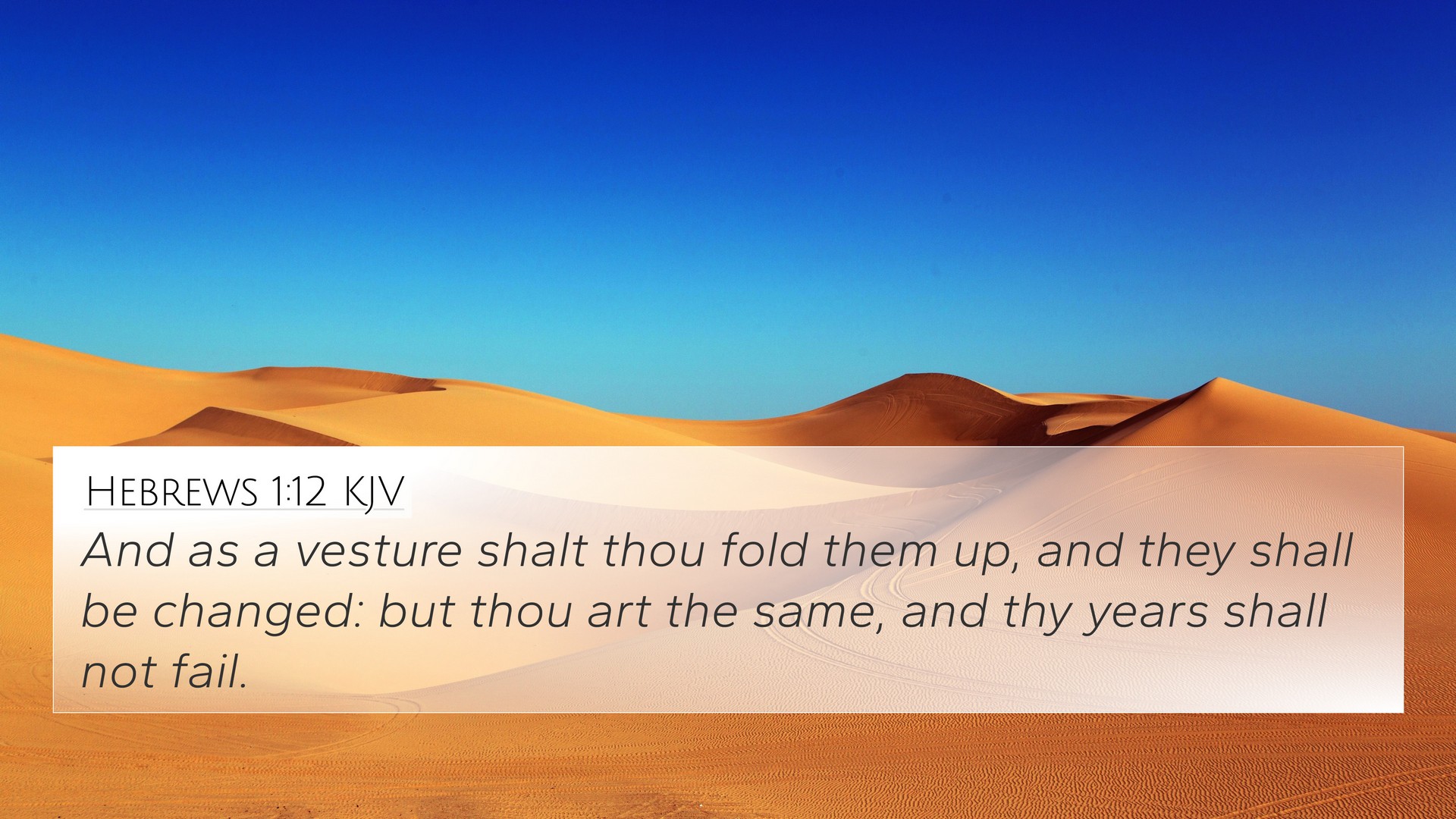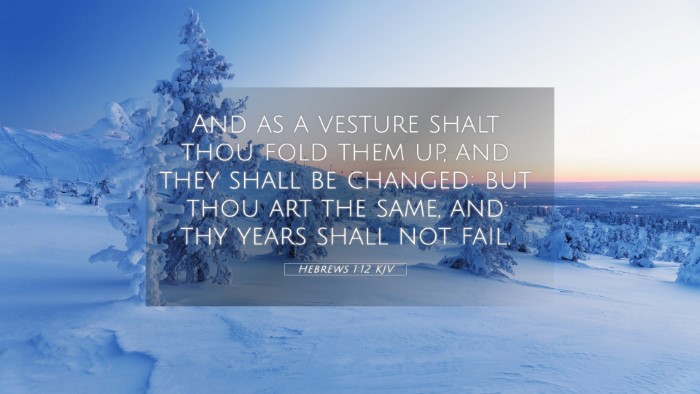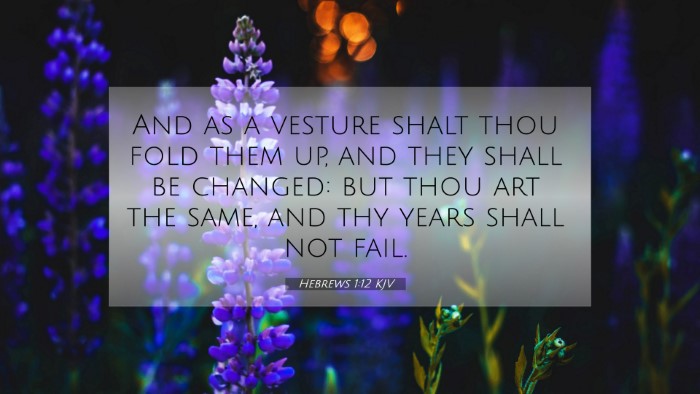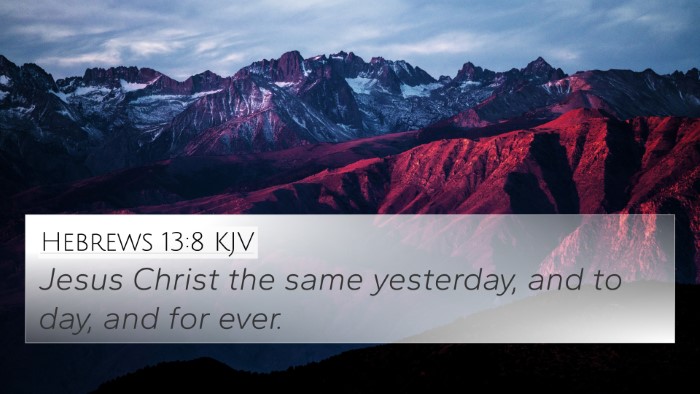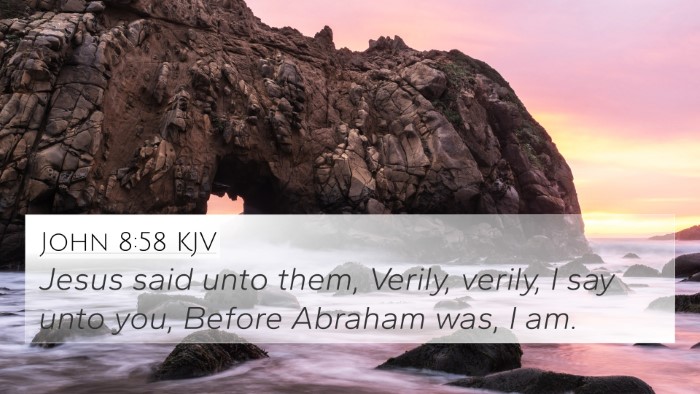Old Testament
Genesis Exodus Leviticus Numbers Deuteronomy Joshua Judges Ruth 1 Samuel 2 Samuel 1 Kings 2 Kings 1 Chronicles 2 Chronicles Ezra Nehemiah Esther Job Psalms Proverbs Ecclesiastes Song of Solomon Isaiah Jeremiah Lamentations Ezekiel Daniel Hosea Joel Amos Obadiah Jonah Micah Nahum Habakkuk Zephaniah Haggai Zechariah MalachiHebrews 1:12 Similar Verses
Hebrews 1:12 Cross References
And as a vesture shalt thou fold them up, and they shall be changed: but thou art the same, and thy years shall not fail.
Uncover the Rich Themes and Topics of This Bible Verse
Listed below are the Bible themes associated with Hebrews 1:12. We invite you to explore each theme to gain deeper insights into the Scriptures.
Hebrews 1:12 Cross Reference Verses
This section features a detailed cross-reference designed to enrich your understanding of the Scriptures. Below, you will find carefully selected verses that echo the themes and teachings related to Hebrews 1:12 KJV. Click on any image to explore detailed analyses of related Bible verses and uncover deeper theological insights.
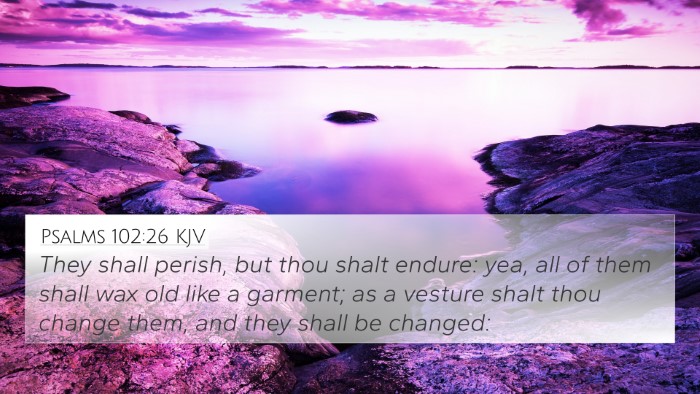
Psalms 102:26 (KJV) »
They shall perish, but thou shalt endure: yea, all of them shall wax old like a garment; as a vesture shalt thou change them, and they shall be changed:

Exodus 3:14 (KJV) »
And God said unto Moses, I AM THAT I AM: and he said, Thus shalt thou say unto the children of Israel, I AM hath sent me unto you.
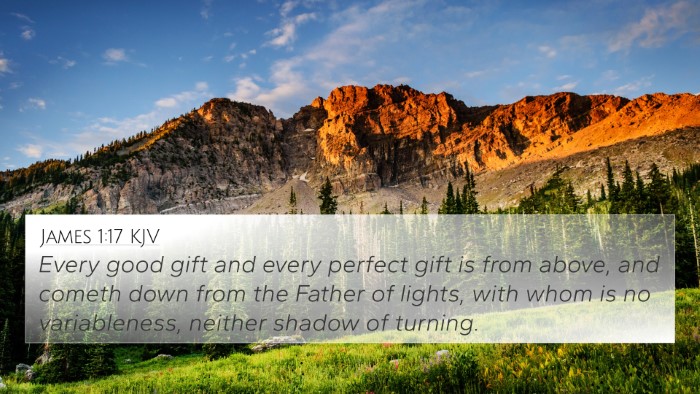
James 1:17 (KJV) »
Every good gift and every perfect gift is from above, and cometh down from the Father of lights, with whom is no variableness, neither shadow of turning.
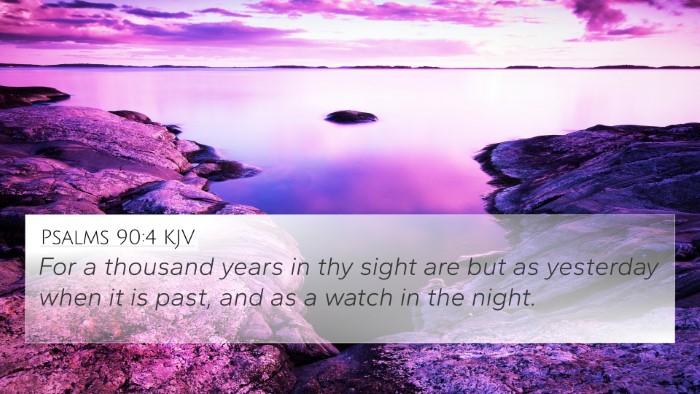
Psalms 90:4 (KJV) »
For a thousand years in thy sight are but as yesterday when it is past, and as a watch in the night.
Hebrews 1:12 Verse Analysis and Similar Verses
Understanding Hebrews 1:12
Hebrews 1:12 states, "And as a vesture shalt thou fold them up, and they shall be changed: but thou art the same, and thy years shall not fail." This verse illustrates profound theological truths about the nature of God in contrast with creation. In this analysis, we will summarize insights drawn from various public domain commentaries, aiming to broaden your understanding of the verse within the framework of Scripture.
Verse Context and Significance
This verse is part of the opening chapter of Hebrews, where the author presents a comparison between Jesus Christ and the angels, emphasizing the superiority of Christ. The context sets the stage for understanding the immutable nature of God versus the transient nature of creation.
Key Themes Addressed
- The Nature of God: The comparison highlights God’s unchanging character as opposed to the changing forms of creation.
- The Transience of Creation: The "vesture" symbolizes the temporal nature of the universe which will eventually be folded away.
- Christ's Eternality: It affirms that Christ is eternal and unchanging, serving as the constant in contrast to the fleeting nature of the world around us.
Commentary Insights
Matthew Henry's Commentary
Matthew Henry emphasizes that this verse highlights the contrast between the Creator and the creation. He remarks that the "vesture" signifies the universe which God will roll up and change, just as a garment is folded. This signifies the power of God over all creation, illustrating that while the world is temporal, God remains forever constant. His years do not fail, assuring us of His eternal existence and the continuity of His purpose.
Albert Barnes' Notes
Albert Barnes expounds on the metaphor of "folding up" as indicative of God’s sovereignty over time and space. He explains that just as garments are replaced, so too will the heavens and the earth undergo transformation. The essence of Christ as the same yesterday, today, and forever, speaks to His divine nature and ensures believers of the stability found in Him amidst a changing world.
Adam Clarke's Commentary
Adam Clarke reflects on the significance of God’s immutability in contrast to creation's inevitable decay. He notes that while the physical world undergoes changes, God remains steadfast. Clarke also highlights that this verse serves as an encouragement to believers, reinforcing that their faith rests upon the eternal and unchanging nature of Christ, who is central to their hope and salvation.
Bible Verse Cross-References
Connecting Hebrews 1:12 with other scriptures can deepen understanding and reveal the broader narrative of the Bible.
- Psalm 102:25-27 - Discusses the creation's impermanence in contrast with God's eternal nature.
- Isaiah 51:6 - Invites contemplation on God's everlasting righteousness and the fleeting nature of earth.
- James 1:17 - Affirms God’s consistency and unchanging goodness in a world characterized by change.
- Revelation 21:1 - Speaks to the new heavens and new earth, which emphasizes transformation.
- Malachi 3:6 - Clearly states, "For I am the Lord, I change not," reinforcing God’s immutable nature.
- Hebrews 13:8 - Echoes the sentiment that Jesus Christ is the same yesterday, today, and forever.
- 2 Peter 3:10 - Discusses the eventual melting away of the heavens with fervent heat, paralleling the themes of change discussed in Hebrews 1:12.
Applying the Insights
By considering themes of change and permanence, believers can gain hope and stability in their faith. The connections outlined also serve as practical tools for Bible cross-referencing, aiding in deeper theological study and sermon preparation.
Tools for Further Study
- Bible Concordance: Useful for finding cross-references and thematic links.
- Bible Cross-Reference Guide: A resource for exploring detailed relationships among scriptures.
- Cross-Referencing Bible Study: Methodologies for deeper analysis and understanding of verse connections.
- Bible Reference Resources: Tools to help identify and understand the dynamics between verses.
- Bible Chain References: A technique to trace themes throughout scripture interconnectedly.
Conclusion
Hebrews 1:12 provides profound insights into the nature of God and the condition of creation. By integrating commentary insights, relevant cross-references, and study tools, believers are better equipped to engage with the text meaningfully. As they explore the connections between these verses, they will find a richer understanding of Scripture's cohesive message about God’s eternal nature and Christ's unparalleled position in salvation history.
